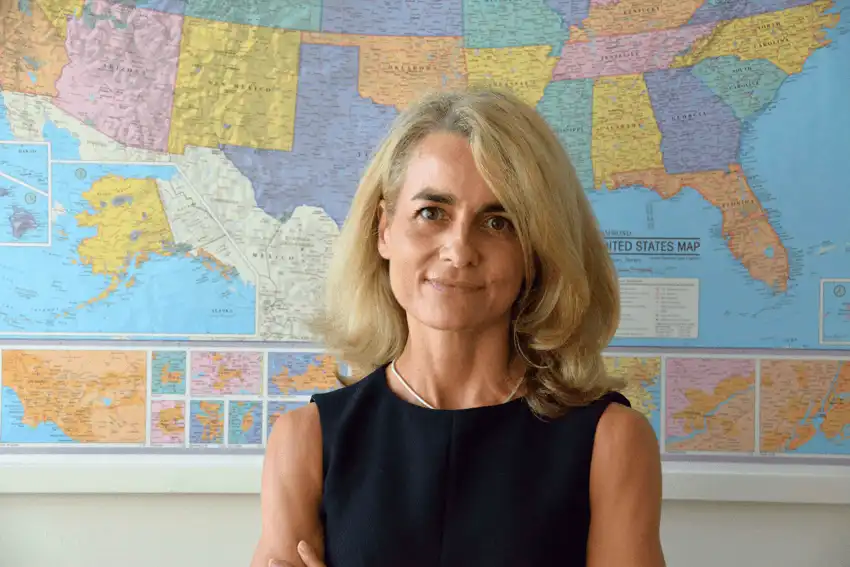Home>Nathalie (née Estival) Broadhurst: "It's at Sciences Po I decided to become a diplomat"
24.05.2020
Nathalie (née Estival) Broadhurst: "It's at Sciences Po I decided to become a diplomat"

Nathalie Broadhurst’s resume checks all the boxes for a high level French diplomat. The current chargée d’affaires at the French embassy in Washington has also held postings at the embassy in Beijing and the Quai d’Orsay and worked on, among other things, international development, EU relations, and UN affairs. Before that, of course, she graduated from Sciences Po and ENA, the National School of Administration. But as a teenager, Broadhurst did not envision the life of a diplomat. Though her mother is from Paris, she was born abroad and raised in a small town in province.
“I wanted to become a journalist at the time,” Broadhurst says. “And I heard about Sciences Po as a very famous school, but difficult to enter—for the elite of the Parisians, the happy few.” She didn’t come from a family of civil servants and Sciences Po graduates, her father an architect, her mother a psychologist, so for her the very idea of the school was quite abstract.
Broadhurst entered a very selective preparation class for the “concours des grandes écoles” called “Hypokhâgne” that prepared her for the entry exam. She also took preparatory summer classes, but her sacrifice, she soon found, was worth it, earning her admittance to the school.
The experience of being a student at Sciences Po was a marvel. Many of Broadhurst’s instructors had careers outside of academia as civil servants. She recalls that everyone wanted to take an administrative law course taught by Valérie Pécresse, who now serves as president of the Île de France region.
The future diplomat was also struck by the school’s multiculturalism. “A lot of people who had spent part of their life or most of their life in different countries, and that’s what fascinated me,” she says. Her friends came from Germany, Switzerland, Spain and Britain. This was the early 1990s, and many people had mastered foreign languages. But she knew that her peers at HEC and the Sorbonne were just not getting the same exposure to other countries. “It’s at Sciences Po I decided to become a diplomat,” she says.
Sciences Po student life was vibrant at Sciences Po. Broadhurst got involved with the cinema club, writing reviews of films, and took advantage of the option go parachuting. But for all the good memories there was quite a bit of stress due to the heavy workload. Broadhurst describes “a very high-intensity scolarité.”
However, this hard work paid off. The Sciences Po curriculum lasts three years, but Broadhurst opted for an optional fourth year of courses geared toward preparation for ENA and other administrative institutions. These classes taught her how to sift through vast amounts of information. This was useful for the ENA entry exam; what made the difference was the ability to go faster and identify key details. Sciences Po taught Broadhurst how to focus on important pieces of information: “You just have to prioritize all the time,” she says.
At ENA, she spent six months stationed at the French embassy in Beijing, where she met her husband, an American. Upon graduating from ENA, Broadhurst left with a class rank high enough to earn a posting at the foreign ministry in Paris. She spent the next several years moving around: Back to China, then Paris, then Beijing again. She took on a more political role during her tour in China from 2005-09, returning to France again to be special adviser to the new Global Affairs Directorate. She was fascinated by the issues at the core of its work: Global health, economic diplomacy, development policy and climate change.
By 2015, Broadhurst had been appointed to the chargé d’affaires role in Washington. She crossed paths with the ambassador at the time, Gérard Araud, when he was France’s UN ambassador. This was the last year of the Obama administration, and she relished the opportunity to observe such a historic period in American politics. Broadhurst says that she was supposed to leave last year but could not refuse the extension of her post when a new ambassador arrived; she’d been around for the first three years of the current administration and knows all about the political environment.
Her next move might take her back to a familiar domain: working on global issues and multilateral diplomacy. Context allowing, with the coronavirus pandemic still shaping international events, she will likely return to UN affairs.
This progression of interesting jobs at the center of France’s relations with the rest of the world started with Sciences Po, she says: “That’s really what initiated my calling, or my vocation, to be a civil servant.”